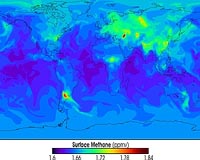| . |  |
. |
Beijing (AFP) Oct 30, 2009 China and India could use their growing clout to shame developed countries into committing to a climate change deal in Copenhagen in December, the UN's top climate scientist said Friday. Rajendra Pachauri, chairman of the Nobel-winning Intergovernmental Panel on Climate Change, told AFP on the sidelines of a conference in Beijing the two Asian giants would have "a lot of moral force" at the global talks in Denmark. "China and India can play that kind of role," Pachauri said in an interview. "(They can) take a few steps beyond what the developed world expects them to do and then they can point the finger at developed countries and tell them, 'Look, in comparison, we are much poorer than you, yet we are taking all these actions so why don't you do what is expected of you'." The high-stakes conference in the Danish capital from December 7-18 will see nations attempt to hammer out a new treaty on combating global warming to replace the Kyoto Protocol, which expires in 2012. Pachauri said he was "cautiously optimistic" a deal would be reached but warned the United States could be a stumbling block if climate change legislation was not passed by the US Senate ahead of the talks. "The rest of the world is not going to be motivated to make emissions reductions until they see the US part of that arrangement," Pachauri said. Failure by the US Congress to pass the climate bill in time would "throw a spanner in the works", said Pachauri, whose organisation shared the 2007 Nobel Peace Prize with former US vice president Al Gore. Pachauri said he hoped developed countries would agree to cut emissions by 25-40 percent by 2020 and provide financing to very poor countries trying to adapt to climate change. While developing countries should not be expected to reduce emissions, they should agree to "deviate from business as usual", he said. "I think the global community should accept that because you cannot, at this stage of development of these countries, impose reductions or limitations on emissions," Pachauri said. China and India, among the world's biggest polluters, last week signed a five-year agreement to cooperate on climate change leading up to the summit. They have so far taken a united stand on rejecting binding emissions cuts, arguing that carbon caps will hinder their quest for economic development and poverty alleviation. Chinese President Hu Jintao told the United Nations last month that Beijing would reduce the carbon intensity of its economy by a "notable margin" by 2020 from their 2005 levels, but did not provide a figure. Carbon intensity is the measure of greenhouse gas that is emitted per unit of economic activity. India has said it was ready to set non-binding targets for cutting carbon emissions in a bid to shed its image as an intransigent polluter. Share This Article With Planet Earth
Related Links Climate Science News - Modeling, Mitigation Adaptation
 Interactions With Aerosols Boost Warming Potential Of Some Gases
Interactions With Aerosols Boost Warming Potential Of Some GasesNew York NY (SPX) Oct 30, 2009 For decades, climate scientists have worked to identify and measure key substances - notably greenhouse gases and aerosol particles - that affect Earth's climate. And they've been aided by ever more sophisticated computer models that make estimating the relative impact of each type of pollutant more reliable. Yet the complexity of nature - and the models used to quantify it - continues to ... read more |
|
| The content herein, unless otherwise known to be public domain, are Copyright 1995-2009 - SpaceDaily. AFP and UPI Wire Stories are copyright Agence France-Presse and United Press International. ESA Portal Reports are copyright European Space Agency. All NASA sourced material is public domain. Additional copyrights may apply in whole or part to other bona fide parties. Advertising does not imply endorsement,agreement or approval of any opinions, statements or information provided by SpaceDaily on any Web page published or hosted by SpaceDaily. Privacy Statement |